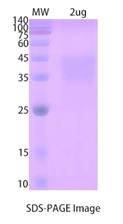普健生物(武汉)科技有限公司(AtaGenix)
Recombinant Human TIM3 protein


- 1
- 产品信息(Product Details)
- 如何订购
- 说明书
概述(Summary)icon
英文全称
Recombinant Human TIM3 protein
纯度(Purity)
>90% as determined by SDS-PAGE
内毒素(Endotoxin level)
Please contact with the lab for this information.
蛋白构建(Construction)
A DNA sequence encoding the human TIM3 (Ser22-Arg200) was fused with His tag
Accession #
Q8TDQ0
表达宿主(Host)
E.coli
种属(Species)
Homo sapiens (Human)
预测分子量(Predicted Molecular Mass)
20.95 kDa
制剂(Formulation)
Supplied as solution form in PBS pH 7.5 or lyophilized from PBS pH 7.5.
运输方式(Shipping)
In general, proteins are provided as lyophilized powder/frozen liquid. They are shipped out with dry ice/blue ice unless customers require otherwise.
稳定性&储存(Stability &Storage)
Use a manual defrost freezer and avoid repeated freeze thaw cycles.
Store at 2 to 8 °C for one week .
Store at -20 to -80 °C for twelve months from the date of receipt.
Store at 2 to 8 °C for one week .
Store at -20 to -80 °C for twelve months from the date of receipt.
复溶(Reconstitution)
Reconstitute in sterile water for a stock solution.A copy of datasheet will be provided with the products, please refer to it for details.
背景(Background)icon
背景介绍
Hepatitis A virus cellular receptor 2 (HAVCR2), formerly known as T cell immunoglobulin and mucin domain-3 (TIM-3), is a transmembrane glycoprotein expressed on the surface of terminally differentiated Th1 cells but not on Th2 cells. It was the first surface molecule that specifically identifies Th1 cells in both mice and human. Recently, identification of Galectin-9 as a ligand for TIM-3 has established the TIM-3-Galectin-9 pathway as an important regulator of Th1 immunity and tolerance induction. Engagement of Tim-3 by its ligand galectin-9 negatively regulates IFN-gamma secretion and influences the ability to induce T cell tolerance in both mice and man. It suggests a novel paradigm in which dysregulation of the TIM-3-galectin-9 pathway could underlie chronic autoimmune disease states, such as multiple sclerosis. Recent work has explored the role of TIM-3 in systemic lupus erythematosus (SLE), and their results indicate that TIM-3 may represent a novel target for the treatment of SLE. Numerous studies have demonstrated that Tim-3 influences autoimmune diseases, including diabetes and multiple sclerosis, and its role in other inflammatory diseases including allergies and cancer is beginning to become clear. In tumor rejection model, soluble form of Tim-3 (sTim-3) significantly impaired T cell antitumor immunity, evidenced by decreased antitumor CTL activity and reduced amount of tumor-infiltrating lymphocytes in tumor. sTim-3 as an immunoregulatory molecule that may be involved in the negative regulation of T cell-mediated immune response.
分子别名(Alternative Names)
Hepatitis A virus cellular receptor 2,HAVcr-2,T-cell immunoglobulin and mucin domain-containing protein 3,TIMD-3,T-cell immunoglobulin mucin receptor 3,TIM-3,T-cell membrane protein 3,CD366.
Noteicon
For research use only .
1搜索商品:关键字搜索;分类导航搜索;产品联系:手机/微信同号:15972188750,座机:027-65279366(推荐 !)
2产品选购:确定好产品信息与规格,向产品客服询问底价
3提交订单:向客服提交收货人信息,选择送货方式,支付方式,发票信息
4产品发货:发票随产品一起发送,耐心等待收货即可
质量保证:
所售产品均经过严格的质量检验,确保所供产品的技术指标与生产厂家的目录、说明书、质检报告上的描述一致,请放心选购。
质量与免责说明:
买方验收产品时,如发现产品短缺、不匹配、包装破损等情况,请保持产品原包装状态,并在收货七个工作日内,以书面方式向我司提出异议。逾期未提出异议视为合格。
买方保管产品时,应按照产品标签、说明书所示保管条件保存,如系保管不当导致产品质量问题,恕不受理。
买方使用产品时。如发现产品质量问题,应在使用初期提出,而非在使用完或快使用完时提出,以备我司回收产品,确认产品质量。如确属质量问题,我司负责调换或退货。发生索赔事宜,我司将在产品价格额度范围内酌情赔偿,恕不受理超出产品本身价值之部分。自收货之日起,超过三个月未反映产品问题,恕不退换。
我司所提供的产品仅限于专业人士的科学研究使用,不得用于临床诊断或者治疗,若有单位或者个人擅自改变我司产品用途,我司不承担任何责任。
普健生物(武汉)科技有限公司(AtaGenix) 鄂ICP备15005566号-1
Copyright © 2024 Lawyer Theme All Rights Reserved
Copyright © 2024 Lawyer Theme All Rights Reserved




